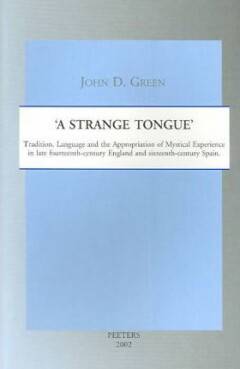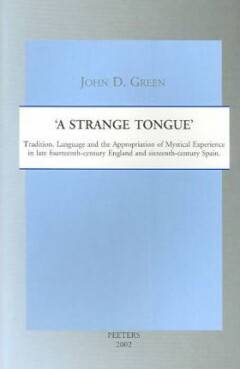
- Retrait gratuit dans votre magasin Club
- 7.000.000 titres dans notre catalogue
- Payer en toute sécurité
- Toujours un magasin près de chez vous
- Retrait gratuit dans votre magasin Club
- 7.000.0000 titres dans notre catalogue
- Payer en toute sécurité
- Toujours un magasin près de chez vous
'a Strange Tongue'
Tradition, Language and the Appropriation of Mystical Experience in Late Fourteenth-Century England and Sixteenth-Century Spain
Jd Green
30,00 €
+ 60 points
Description
This book is the product of both historical and personal interest in the grounds of religious conviction. It deals with the practice and development of the tradition of 'discernment of spirits' in the late fourteenth-century England and sixteenth-century Spain as reflected in the classical texts of the mystics of the periods; Julian of Norwich, the Cloud Author and Walter Hilton in England and Ignatius of Loyola and John of the Cross in Spain. The tradition of 'discernment' came into being at the very beginning of the Church's history and has been appropriated, adapted and developed throughout its history. The book explores how the tradition is expanded and maintains continuity with its origins and suggests that it reaches some apogee in sixteenth-century Spain for Christian lives of apostolic mission and contemplation. It illustrates how the cultural circumstances of the times moulded the manner in which the experiences of the mystics were perceived. 'Discernment of Spirits' is about how Christians reach some conviction that the stirrings within consciousness which seem to originate so strangely, and yet beckon so persistently, are 'real' in the sense of authentically divine. They are stirrings which call for a response in the lives of mystics. Rowan Williams at the beginning of his influential book, The Wound of Knowledge, refers to 'the intractable strangeness of the ground of belief that must constantly be allowed to challenge the fixed assumptions of religiosity; it is a given whose question to each age is fundamentally one and the same'. This book illustrates how the question is addressed in the texts of the mystics. In our own time the strange stirrings which intimate the question tend to be drowned by a multiplicity of competing voices. The suggestion is made that when we listen to the voices of the past we may be encouraged to wonder about the question posed by the stirrings within our own consciousness, hitherto unheard or dismissed as simply 'strange'.
Spécifications
Parties prenantes
- Auteur(s) :
- Editeur:
Contenu
- Nombre de pages :
- 227
- Langue:
- Anglais
- Collection :
- Tome:
- n° 9
Caractéristiques
- EAN:
- 9789042912366
- Date de parution :
- 30-10-02
- Format:
- Livre broché
- Format numérique:
- Trade paperback (VS)
- Dimensions :
- 162 mm x 246 mm
- Poids :
- 394 g

Les avis
Nous publions uniquement les avis qui respectent les conditions requises. Consultez nos conditions pour les avis.






